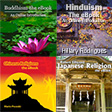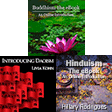Buddhism–The eBook
An Online Introduction
by Charles Prebish and Damien Keown
Buddhism Online:
Class Discussion Questions
- Chapter 1
- Class Discussion Questions
-
- In what ways is the Buddhist worldview similar to or different from the traditional Western one, and how do both of these compare to the current scientific way of thinking? Is time linear or cyclic? Are events unique or do the same things happen over and over (like birthdays, Christmas, and Monday mornings)? Are the Buddhist and Western conceptions incompatible?
- Does it make sense to believe in reincarnation? If "no," are people like the Buddha deluded when they claim to remember past lives? If "yes," what evidence is there for it? What difference would it make to you now if you believed you would be reborn and live again?
- Is karma the same as destiny, in the sense that everything that happens to you is predetermined? Do you believe that "what goes around comes around," and if so is this the same as karma? Does everyone get what they deserve, in the end?
- ↑
- Chapter 2
- Class Discussion Questions
-
- What problems are there in writing a biography of Buddha? How far back would you have to go, and what sources would you use?
- Can any of the information in Buddhist sources about Buddha's life be relied on? Is there any archaeological evidence that can help corroborate it?
- Do you think Buddha's own experience (such as losing his mother as an infant, being cosseted in a palace) had any influence on his outlook on life? Was it selfish of him to abandon his wife and child in order to seek enlightenment?
- ↑
- Chapter 3
- Class Discussion Questions
-
- Is the First Noble Truth right when it claims that "all existence is suffering," or is Buddhism overly-pessimistic in its assessment of the human condition? What sort of things are included in the scope of the term duhkha?
- Do people have a soul, and if so, what is it like? If not, what is it that makes you who you are, and how do you remain the same person if—as science tells us—the material basis of your being changes continuously? If your memories changed, would you be someone else?
- If the Noble Eightfold Path leads to nirvana, why is nirvana not mentioned anywhere in it? Is nirvana reached as the ninth stage of the path, or if not, when?
- ↑
- Chapter 4
- Class Discussion Questions
-
- Why does the monastic sangha require such a rigorous behavioral code as opposed to the less difficult guidelines for the laity?
- Why do the Buddhist nuns seem to occupy a lower, lesser position then the monks in the early Buddhist sangha?
- Would it be acceptable for the early Buddhist communities to alter the various Buddhist behavioral codes?
- ↑
- Chapter 5
- Class Discussion Questions
-
- How might an individual who attains enlightenment in this lifetime act in the mundane world?
- Is meditation training something that should be reserved for the monk or nun, or might it profitably be taught to the laity?
- Can meditation be effectively practiced in an urban setting, or must it be reserved for secluded monasteries?
- ↑
- Chapter 6
- Class Discussion Questions
-
- What circumstances in early Buddhism provided the occasion for the rise of Mahayana?
- Are the Mahayana sects as different from one another as the sects of early Buddhism?
- Why do you think Mahayana has been so successful throughout East Asia?
- ↑
- Chapter 7
- Class discussion questions
-
- Why do you think Buddhism fragmented so easily into different sects? Did Buddha make a mistake in not appointing a successor?
- Do rulers like Ashoka sometimes use religion for political ends? Is this justifiable?
- Is art important in religion, and if so, why? Do you see any differences between Buddhist and Western styles of art?
- ↑
- Chapter 8
- Class Discussion Questions
-
- What would you say are the main features of Buddhism in Southeast Asia? What variations, and what common themes can be identified?
- What is meant by the "Great Tradition" and the "Little Tradition?" Which is the most important? Give an example of a belief or practice associated with the "Little Tradition."
- Of the four countries discussed in this chapter, is there one that seems to you to be the "odd man out?" Which is it, and why?
- ↑
- Chapter 9
- Class Discussion Questions
-
- How did Buddhism in China grow from a purely Indian import to a distinctly Chinese enterprise?
- Why have Shinto and Buddhism been able to successfully coexist in Japan?
- Why has a nuns' order developed and thrived in Korea and China, but not in Japan?
- ↑
- Chapter 10
- Class Discussion Questions
-
- Is Tantric (Vajrayana) Buddhism a logical addition to the earlier main divisions of Buddhism (that is, so-called "Hinayana" and Mahayana)?
- What are the advantages and disadvantages of the Dalai Lama system?
- Can Tibetan Buddhism survive outside its native homeland?
- ↑
- Chapter 11
- Class Discussion Questions
-
- What constitutes "being a Buddhist" in Western cultures?
- Is western Buddhism too faddish to make a significant impact on Western cultures?
- Why has Buddhism become so popular in Western cultures in recent years?
- ↑
- Chapter 12
- Class Discussion Questions
-
- Who are the leading thinkers and activists in the engaged Buddhism movement? What traditional Buddhist values can you detect in engaged Buddhist practice? How does Buddhist ecology differ from secular ecology, if at all?
- What are the main aims and objectives of the Buddhist Peace Fellowship and how does it aim to achieve them?
- Is Buddhism more or less environmentally friendly than Christianity? Which aspects of Buddhist teachings might make it appear in harmony with contemporary ecological attitudes? Do you think Buddha was concerned about the environment?
- ↑
- Chapter 13
- Class Discussion Questions
-
- How do the Buddhist Five Precepts differ from the Christian Ten Commandments? Can Buddhist moral teachings have any force if Buddhism does not believe in a divine lawgiver? Are there any universal moral values or is morality determined primarily by local culture?
- According to Buddhism, when does life begin? If Buddhism is opposed to abortion, how is it that so many performed in Thailand? What is involved in the Japanese mizuko kuyo ritual, and do you think it is a good idea?
- Some Western Buddhists believe in a "right to die" arguing that since death in these cases is voluntary, there is no conflict with ahimsa (non-harming). Would you agree? Could turning off a life-support machine ever be the right thing to do for a Buddhist patient? Why should euthanasia be a moral issue for Buddhists if the patient will soon be reborn?
- ↑
- Chapter 14
- Class Discussion Questions
-
- Do you think the story of the blind man and the elephant applies to the study of Buddhism? Why or why not?
- Does the growth of "scholar-practitioners" in Buddhist Studies help or harm the discipline? Why, or why not?
- Should Buddhist Studies continue to emphasize rigorous philological training for its scholars, or should it accept current Western language translations as sufficient?
- ↑



